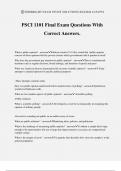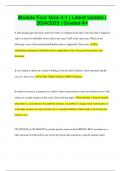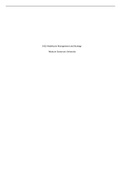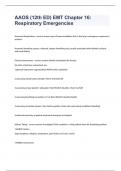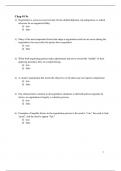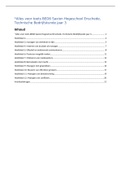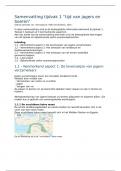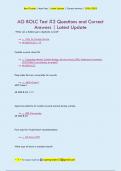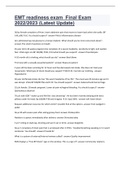PSCI 1101 Final Exam Questions With
Correct Answers.
What is public opinion? - answer✔✔Political scientist V.O. Key stated that "public opinion
consists of those opinions held by private citizens which governments find it prudent to heed"
Why does the government pay attention to public opinion? - answer✔✔Due to constitutional
freedoms such as regular elections, broad suffrage, and freedom of speech and press
What was American history characterized by in terms of public opinion? - answer✔✔-Early
attempts to channel opinion for specific political purposes
-These attempts continue today
How was public opinion understood before modern forms of polling? - answer✔✔politicians
would read bathroom walls
What are two modern aspects of public opinion? - answer✔✔-Scientific polling
-Public relations
What is scientific polling? - answer✔✔-Developed as a tool for systematically investigating the
opinion of ordinary people
-Devoted to sounding out public on an endless array of issues
What are public relations? - answer✔✔Marketing ideas, policies, and politicians
What is the challenge of measuring public opinion? - answer✔✔To obtain a sample that's large
enough to be representative but not so large that improvements in accuracy are compromised
(sample sizing)
What is the margin of error? - answer✔✔A quantity that describes how close the sample is to the
general population
, ©THEBRIGHT EXAM STUDY SOLUTIONS 8/22/2024 12:54 PM
What is measurement error? - answer✔✔Indicates uncertainties in public opinion that arise from
imperfect connection between the wording of survey questions and the terms in which people
understand and think about political objects
What is the standard goal in modern polling? - answer✔✔-To obtain a sample that has a margin
of error no higher than 3% (ideal)
-This means that 95% of the time the samples division on a particular question will fall 3
percentage points of the entire populations division
What are sources of mistakes in polling? - answer✔✔-It is very difficult to find a truly random
sample of the entire population
-People refuse to answer questions and some may lie
-A third issue deals with misinterpretation of the questions asked in polls
Why is it difficult to find a random sample? - answer✔✔No easily available registry exists of the
population so researchers must rely on representative samples
What is the problem with people refusing to answer or lying? - answer✔✔-If the refusers or liars
differ systematically from those who don't refuse or lie polling accuracy can suffer
-Researchers use weighting to try to make polling representative but this doesn't solve the issue
of non-representativeness completely
Despite the limitations of public polling have politicians come to embrace polling? - answer✔✔-
Yes since jimmy carter every president has had an in house pollster
-George W. Bush maintained access to an estimated $1million in public research annually
-Barack Obama had access to more than $4 million in polling services during his first 18 months
in office
What do public opinion scholars think? - answer✔✔Think that "expressed opinions reflect
underlying attitudes"
, ©THEBRIGHT EXAM STUDY SOLUTIONS 8/22/2024 12:54 PM
What is an attitude? - answer✔✔-An "organized and consistent manner of thinking, feeling, and
reacting with regard to people, groups, social issues, or more generally, any event in one's
environment"
-"An attitude combines feelings, beliefs, thoughts, and predispositions to react in a certain way"
What do most people have in terms of political attitudes? - answer✔✔- "Loosely structured sets
of political attitudes"
- Also differ in terms of the intensity of their beliefs
What is ideology? - answer✔✔-Refers to "elaborate organized sets of political attitudes"
-Liberal vs. conservative is the common ideological fault line in contemporary american politics
Do people usually label themselves as liberal or conservative? - answer✔✔-Very few americans
are rigidly liberal or conservative
-The majority don't classify themselves as either liberal or conservative when asked to place
themselves on an ideological scale
What does partisanship mean? - answer✔✔-Refers to Americans political affiliations
-An extremely strong predictor of attitudes
Is it easy to change an individual's partisanship affiliation? - answer✔✔-Usually very difficult to
change
-Stable over time
What are the three ways people acquire their opinions? - answer✔✔-Political socialization
-Shortcuts
-Framing

